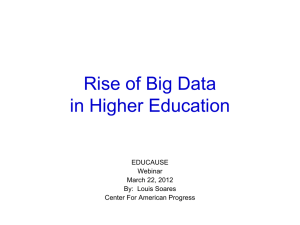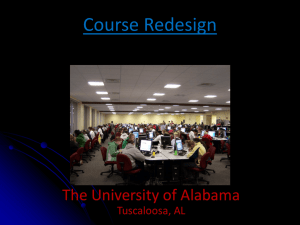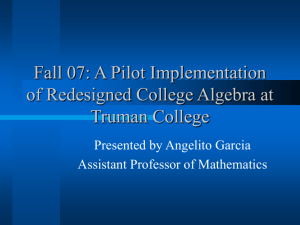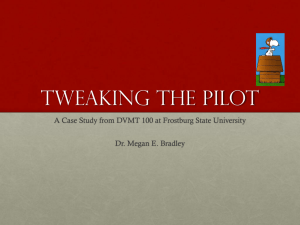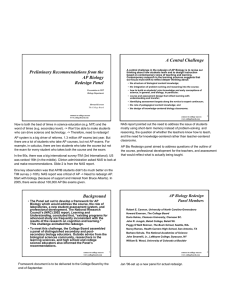Biology 101 - University System of Maryland
advertisement
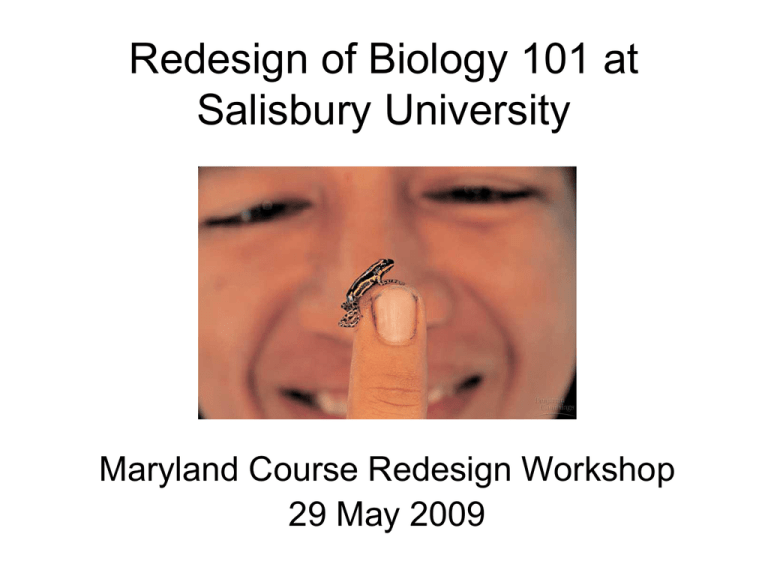
Redesign of Biology 101 at Salisbury University Maryland Course Redesign Workshop 29 May 2009 SU Redesign Team • • • • • • • • • • • • • Clem Counts* Mark Frana Sam Geleta Ron Gutberlet* Mark Holland Wanda Kelly* Joan Maloof Claudia Morrison-Parker Wanda Perkins Betty Lou Smith* Bob Tardiff Melissa Thomas McGraw-Hill Dr. Les Erickson, learning technology guru (left) – Heidi Freund, Meghan Moreau, Matt Swinand • Enhancement of online learning in Biology 210 – Kim Hunter, Richard Hunter *current instructors Selected Goals of Biology 101 • Improve biological literacy of our students • Demonstrate relevance of biological science to all citizens • Create a positive experience of biology, doing justice to the amazing natural world • Distinguish science from non-science • Share practical information about personal and environmental health Selected Components of Redesign • Use of Blackboard to deliver online content that partially replaces traditional lectures – – – – – – – Weekly instructions Study guide Reading assignments Online lesson from McGraw-Hill Practice activities from McGraw-Hill Additional links Online quiz • Maximize use of lab time for activities, discussion, team contests • Use of clickers to engage more students, to initiate discussions, and to automate some grading Value of Pilot (Spring 2008) • Learned that “lecture” time could probably be reduced to one hour per week • Learned that some traditional lecture is probably beneficial • Student reaction to an eBook was generally negative. • Developed online course component • Single instructor • Student feedback prior to full implementation Course Structure Traditional Initial Redesign Full Redesign “Lecture” hrs/week students/section sections 3 72-96 6 1.5 96 6 1 120 4 Lab hrs/week students/section sections 2 24 20 2 24 20 2 24 20 Selected Enhancements to Course Structure • The same instructor now teaches all of the lab sections (5) from their “lecture” section. • One section of Biology 101 with its 5 labs is a full teaching load. • Course Coordinator • Lab Coordinator Additional Enhancements • Complete revision of lab manual during summer 2008 • Academic value of lab time is maximized— activities and small group discussion. • Revision of online materials based on student and instructor feedback. • Course drift minimized through use of common online materials and faculty cooperation and compromise (summer and fall 2008). Evaluation and Assessment • Student surveys – Response to course is generally positive – Students spend more time working on course material • Embedded exam questions – Student performance has improved or stayed the same • DFW rates – Decrease from 11 to 6% for one instructor – Heterogeneous results during fall 2008 • Full implementation in spring 2009 – Analysis pending Student Comments • “I liked the online style of the course.” • “Online quizzes were helpful.” • “I usually do not like bio but it quickly became my favorite this semester.” Student Comments • “I really like the mix between online work and class time.” • “It is new and a little hard to get used to, but I like it!” • “I never really liked bio until now.” Cost Reduction—Overload Pay Fall 2006 (Traditional) Spring 2009 (Redesign) Fall 2009 (Projected) $10,370.48 $1196.00 $0 Cost Reduction—Cost per Student Traditional (Spring 2007) Redesign $269.30 $51.85* *further evaluation pending Implementation Issues • Not all instructors “bond” with clickers. • Comfort level of instructors improves significantly after one semester. • Student attitudes and expectations evolve quickly. – Some resistance (very limited) to course design during pilot – New students don’t necessarily expect the more traditional course format. Selected Faculty Reservations • Decreased classroom time and the uneasy feeling of not telling students information directly and in person • Concern that workload could increase • Both have been addressed. Support from Department, Institution, and McGraw-Hill • Assigned time to prepare and implement the pilot; workload discussion ongoing • Department faculty and university administration supportive and encouraging • Good advice from redesign team and other colleagues • Excellent support (advice, implementation, etc.) from our Instructional Technology group • Free online course and eBook from McGraw-Hill for students in the pilot section

